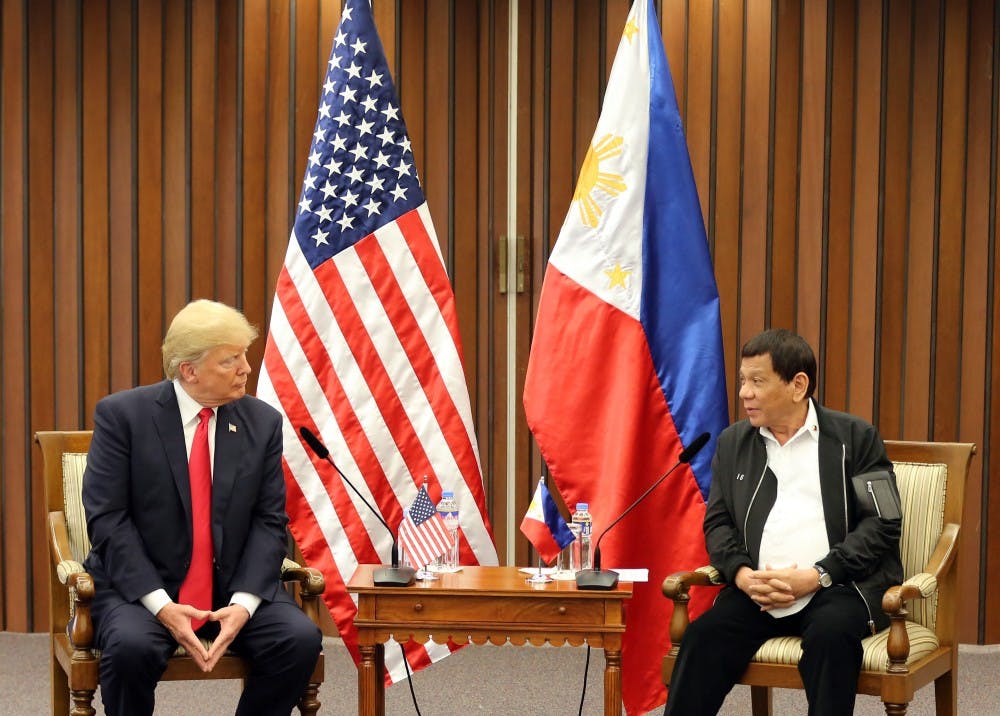No stranger to extreme and incendiary rhetoric, President Trump has recently floated the idea of killing drug dealers in the United States. The idea, obviously borrowed from the draconian policies of the controversial Philippine leader Rodrigo Duterte, is Trump’s proposal to end the national opioid epidemic that has led to tens of thousands of deaths from overdose.
For Trump, drug dealers are murderers who need to be treated as contemptuously as serial killers. At a rally in Pennsylvania earlier this month, he bemoaned the fact that drug dealers can kill “thousands” of people over the course of their lifetimes and yet face almost no real consequences.
As usual, Trump is confused on the facts. He claims that many dealers will kill over 5,000 people via fatal drug overdoses, but that these supposed mass-murderers receive light punishments like a 30-day jail sentence. This is a pretty obviously false statement, as any drug dealer who is being sentenced for only 30 days is likely a small-scale dealer who doesn’t have anywhere near the amount of clients possible for them to be personally responsible for thousands of deaths.
A nuanced consideration of the facts unfortunately is not really Trump’s style, as he prefers playing the strongman and issuing sweeping and bombastic statements meant to showcase his supposed strength and tough attitude. In reality, the people responsible for the mass distribution leading to thousands of deaths are kingpins far removed from the street dealer who gets sentenced to a month in prison, but Trump wants them dead regardless. This lack of nuance is emblematic of the Trump “solution,” which would turn America into the kind of quasi-fascist police state represented by Duterte’s Philippines and would fail to solve the actual issues at hand.
It’s undeniable that the opioid crisis currently gripping America is a serious problem. Every day, 115 Americans die due to overdosing on opioids. While ending the crisis is obviously desirable, Trump’s proposal will likely fail or make matters worse. For one thing, the war on drugs, like Prohibition before it, can largely be seen as a failure. As every college student knows, drugs are still plentiful and readily available despite the decades of strict drug laws and the billions upon billions spent on the war on drugs every year.
America has seen its prison population swell to absurd levels and an increase in racial tension over the racial disparities of drug arrests. Armed and violent Mexican gangs, like the gangsters of Prohibition before them, have accrued extreme wealth and influence as they satisfy the market’s high demand for drugs. Trump ignores all of this and instead demands doubling down on the war on drugs. Following Duterte, whose drug policy is believed to have resulted in 12,000 deaths to date, Trump seems to want to escalate the war on drugs into a literal war, where drug dealers are seen to pose as much of a threat as an enemy in combat.
A step towards solving the drug crisis is treating it as a health issue rather than a moral battle to be won. America should move towards an environment where drug addicts can feel safe to look for medical treatment, and where the government treats those suffering from drug afflictions as people in need of help rather than as criminals. There is also the fact that, no matter how harsh the punishment for dealing is, at least a few suppliers will always rise to meet demand for such a lucrative business. Ending the opioid crisis involves ending the demand for the drug, and that can’t be obtained by executing drug dealers. While such extreme measures might reduce drug supply, they come with the cost of potentially thousands dead like in the Philippines, even more people in our already overflowing prisons and the arrival of a kind of brutal authoritarianism not yet seen in the U.S.
If the last few decades have shown us anything, it’s that throwing money at the drug problem and imposing harsh punishments for drug related offenses doesn’t make the problem go away. Trump’s extreme answer to the opioid crisis ignores this and instead seeks to double down on failed policies while allowing creeping Duterte-style authoritarianism to take hold in the U.S. government. After a short period of positive changes to America’s drug policy, this is not only a step backwards, but a 180 degree turn from progress and towards barbarism.

